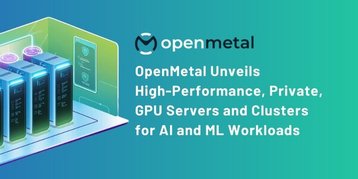Private cloud provider OpenMetal has added Private GPU servers and clusters to its offering.
The company's GPU offerings feature Nvidia H100 and A100 GPUs and can be deployed as standalone nodes or part of larger clusters. They have been launched to enable AI, machine learning, and HPC workloads.
"Public cloud GPU access is riddled with limitations—premium pricing, throttled performance, and infrastructure you don't truly control," said Rafael Ramos, director of Software Engineering at OpenMetal. "We built our GPU Servers and Clusters to provide a different experience: complete control, transparent pricing, and no compromises on performance or privacy."
The OpenMetal GPU infrastructure is a dedicated bare metal offering with no virtualization layer, giving customers full control of their hardware. The clusters can be customized by GPU count, CPU/GPU pairings, RAM configurations, and storage volumes.
The company is targeting sectors where data locality, compliance, and infrastructure control are particularly important, including the healthcare, finance, and research sectors.
The offerings are currently available in OpenMetal's US East and West regions, with expansion to Europe and Asia planned for later in 2025.
OpenMetal was originally created by InMotion Hosting as the company increasingly used OpenStack and Ceph. The company's offerings include bare metal dedicated servers, ceph storage clusters, GPU servers & clusters, and on-demand hosted private clouds, all powered by OpenStack.
The company has data center locations in Los Angeles, Califonia, and Ashburn, Virginia in the US; Amsterdam in the Netherlands, and Singapore. It leases space from Equinix in Virginia and Digital Realty for its other three regions.
The company says it aims to take a stance against the monopolization of the cloud computing industry by a few large companies, noting on its website: "In addition to the inherent problems of high costs from public clouds, we believe that the massive consolidation of infrastructure and software into a tiny set of public cloud providers is dangerous on numerous levels.
"A balancing force of clouds, operated by smaller companies, smaller governments, and even individuals, is critical to the long-term health of IT."







